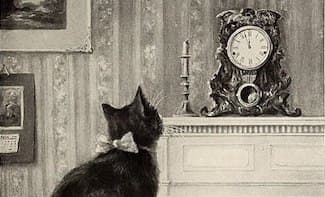Weekend Essay: However You Spend It, Make This Your Summer’s Day
All any of us has is a choice about how fully and faithfully we’ll lean into our moments, both momentous and mundane.

What a strange phenomenon — that, despite its absolute nature, time can stretch before us lazily as life’s more impotent phases take hold, or it can outpace us, awakening our sense of mortality and panic about unmet goals and elusive dreams.
These past two years, as Covid-19 blazed across the globe, I have felt, first, that we were losing time. Losing time to hours and hours on computer and television screens, when we needed it to deepen relationships and meet new soulmates and friends; to adventure when our able bodies and youthful energy are best suited for it; to visit family while they’re still here.
While in the pandemic’s vise, it was hard not to feel like our time — our very existence — was being squandered.
Yet, as we’ve adapted to our “new normal” and shifted to acceptance from denial, I’ve begun to feel my vaccinated musculature relax. Time has softened her threats, and I feel an invitation. I have time to brush up on my sewing skills under my mother’s tutelage; time to host dinner parties late into the night; time to spend alone, listening to podcasts and new music while I walk miles and miles of city streets; time to write my first novel, putting aside fears that it may never see its name in print; time for weekend trips with friends; time enough to fall in love.
In the last two years, life’s underlying ruler — the chaotic core — appeared at the surface. Even those of us already acquainted with loss encountered a foundational, persistent, and global mayhem that made it impossible to remain naive about our lack of control over life’s bloom and fade. And perhaps it’s somewhere in that surrender that we find our freedom — freedom enough to take advantage of what time we (may) have.But what, really, is time if our experience of it is so variable and circumstantial? What is time, if two people have it in equal amounts, yet one is beset by panic and the other luxuriates in his perception of great and unharried sprawl?
John Updike was cynical or, at the very least, anxious about time, writing, “Suspect each moment, for it is a thief, tiptoeing away with more than it brings.” The more wistful Bill Waterson said, “There’s never enough time to do all the nothing you want.” And, for his part, Andy Warhol subordinated time, asserting that, “They always say time changes things, but you actually have to change them yourself.”
More than all the others, I favor Antoine de Saint-Exupery’s orientation. In his unparalleled “Little Prince” — my ideological life’s constant companion — the main character learns why his attachment to his own garden’s rose is far greater than anything he feels toward flowers tended by others. “It is the time you have wasted for your rose that makes your rose so important,” his friend, the fox, explains to him. Elsewhere, when the fox laments the prince’s erratically timed arrivals to their daily visits, he says, “It would have been better to return at the same time. … For instance, if you come at four in the afternoon, I’ll begin to be happy by three. The closer it gets to four, the happier I’ll feel. By four, I’ll be all excited and worried; I’ll discover what it costs to be happy! But if you come at any old time, I’ll never know when I should prepare my heart. …There must be rites.”
These two bits of wisdom, I believe, point to the essence of time and the root of its universally felt potential. There’s no concrete way to hoard time or amass more of it, and none of us knows the bounds of our fortune, so to speak. So all any of us has is a choice about how fully and faithfully we’ll lean into our moments, both momentous and mundane.
As children, we were taught to think of time as an organizational tool. It was what stood between us and recess, what marked an hour-long after-school soccer practice, comprised our 45 minutes of homework, limited after-school TV-watching, and lent eight hours of sleep before we woke and moved through the next 24. Time allowed us to design schedules and create contexts within which we measured progress.
But it wasn’t until a recent amalgam of newly acquired sensibilities, born of Covid and aging, that I began to relate to time as currency. The most valuable global currency there is.
Somewhere between the compulsive exercise and insomnia that characterized my early days’ Covid experience and the languishing that supplanted those activities, I realized this one simple and essential truth: Either way, the time will pass. So, we might as well call upon our best, most motivated, and most giving selves to color it with meaning.
I don’t mean to say that I’ve managed incessant productivity. In fact, I’m often at rest. But I have become more intentional in the choice to burn midnight oil or pardon myself from demonstrating a more enterprising velocity. And, as long as my investment choices are deliberate, I will feel a sense of agency; that I am acting within the stretches of opportunity afforded me rather than being acted upon and hampered by time’s uncompromising grip.
Often, now, I think of Mary Oliver’s “The Summer Day,” of the way in which it grants a wide berth for stillness and rest, but insists on a sense of urgency in our allotment of time. Oliver writes:
I don’t know exactly what a prayer is.
I do know how to pay attention, how to fall down
into the grass, how to kneel down in the grass,
how to be idle and blessed, how to stroll through the fields,
which is what I have been doing all day.
Tell me, what else should I have done?
Doesn’t everything die at last, and too soon?
Tell me, what is it you plan to do
with your one wild and precious life?
We ought to pay attention to Oliver’s question, noticing the invitation in it. Maybe you, too, see the import of being idle in nature or maybe you feel bound to endless hours of work. The critical piece is facing yourself with purpose, over and over again, asking how best to spend your dearest currency; asking yourself where in this wide world you’ll cast your responsibility and what you’ll buy with your precious time.

